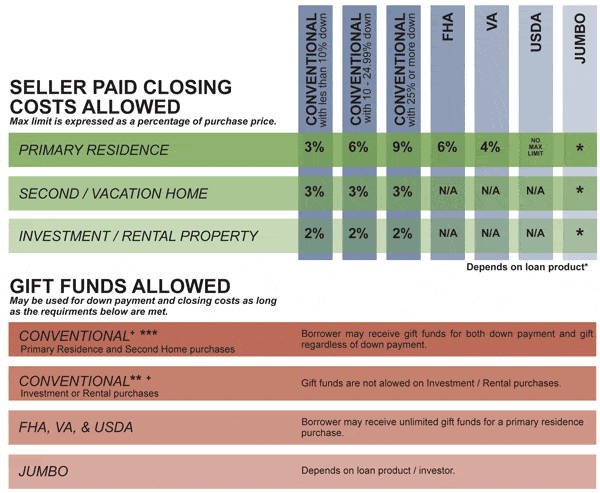In spite of having sufficient income to afford a monthly mortgage payment, some would-be buyers defer a home purchase because they lack funds for a down payment. They assume a mortgage isn’t viable at the present time, but this thinking isn’t necessarily true.
If you don’t qualify for a zero-down mortgage (ex. VA or USDA), and if you don’t have enough in reserves for a down payment, there is a way to purchase a home sooner rather than later. Several mortgage programs allow borrowers to use gift funds for their down payment (and closing costs, for that matter). But while this option is available, there are rules about using gift money.
Buying a home is an exciting milestone but saving up enough for the down payment can be challenging. That’s why receiving a financial gift to put towards your down payment and closing costs can be a huge help. If you’re getting a conventional mortgage you may be wondering – how much can I actually receive as a gift?
The quick answer is that with conventional loans there’s no set limit on down payment gift amounts. As long as the gift funds come from an eligible donor you can receive as much as you need to cover your required down payment, closing costs, and reserve requirements.
However, conventional lending guidelines do impose some restrictions around down payment gifts that are important to understand. In this article, we’ll explain conventional loan gift limits and other rules in detail, so you can take full advantage of this home buying perk.
Conventional Loans Have No Hard Limit on Gift Amounts
The first thing to know is that there is no maximum dollar limit on down payment gifts for conventional loans. As long as the gift comes from an eligible donor you can receive any amount needed to cover
- Your down payment
- Closing costs
- Reserve requirements
You can even use gift funds to cover your entire down payment if needed. The key is that the amount can’t exceed your actual costs – you can’t take cash back at closing from a down payment gift.
This lack of a maximum gift amount makes conventional loans more flexible than government programs like FHA and VA loans. They cap the portion of your down payment that can come from gift funds.
The no-limit policy applies to gifts used on a primary residence or second home. Investment property purchases don’t allow gifts under conventional guidelines.
Who is Considered an Eligible Donor?
While conventional loans don’t limit gift amounts, they do restrict where the funds can come from. Your donor must have a specific relationship to you in order to be considered eligible.
According to Fannie Mae and Freddie Mac requirements, eligible donors for down payment gifts include:
- Your spouse or domestic partner
- A parent, grandparent, or other direct ancestor
- A child, grandchild, or other direct descendent
- A sibling, half-sibling, or step-sibling
- An aunt, uncle, cousin, or other close family member
- The spouse or domestic partner of anyone on the above list
- A fiancé or fiancée
The above list covers biological, adopted, half, and step relationships. Guardianships are also included if the legal guardian is not your biological parent.
Conventional loans may also allow down payment gifts from godparents or other individuals that have a clearly established familial relationship with you, even if not legally documented.
Recent Exceptions to Donor Requirements
Freddie Mac guidelines include a couple unique exceptions to the standard eligible donor list for conventional loans:
Wedding gift exception – You can use wedding gift funds from any source as long as you provide a marriage certificate proving the wedding occurred within the past 3 months.
Graduation gift exception – Monetary graduation gifts are eligible within 3 months of obtaining proof of graduation, such as a diploma or transcript.
These exceptions let you take advantage of down payment gifts even if the donor is not a close family member.
Documentation Needed for Gift Funds
To use gift funds for your conventional loan down payment, you’ll need to provide documentation to your lender:
Gift letter – This letter must be signed by you and the donor, including the donor’s name, address, amount of gift, and relationship. It should state the funds carry no repayment obligation.
Proof of funds – The donor will need to provide bank statements or other documentation showing they have sufficient funds to provide the gift.
Transfer evidence – You’ll need to show the gift was deposited into your account via a withdrawal from the donor’s account, canceled check, etc.
Providing this documentation is key to ensuring the gift funds are eligible for your conventional loan application.
How Much of the Down Payment Must You Pay?
For a primary residence purchase with a conventional loan, you can use gift funds to cover your entire down payment if needed. With a second home or 2-4 unit primary residence, you may have to contribute some of your own funds.
Here are the requirements:
-
Primary residence – Gifts can fund 100% of the down payment
-
2nd home – If your down payment is under 20%, you must contribute 5% from your own funds
-
2-4 unit primary – Same requirement – you must pay at least 5% if your total down payment is under 20%
The requirements drop to just 3% if you use a HomeReady or Home Possible conventional loan.
As you can see, conventional loans offer flexible limits on down payment gifts. Just be sure to only use eligible donor funds and provide the proper documentation. This can make the difference in being able to achieve your home ownership goals.
Frequently Asked Questions on Conventional Loan Gift Rules
Can the seller give me a down payment gift?
No, the seller cannot provide down payment gift funds, as they are technically an interested party in the transaction. However, they can provide closing cost assistance within certain limits.
What if the donor is related to my spouse/partner?
If the gift comes from someone related to your spouse or domestic partner, such as their parent, it is still considered eligible based on your joint relationship.
Is there a limit on closing cost gifts?
While down payment gifts have no set limit, closing costs are capped if paid by an interested party like the seller or realtor. The limit is 3% if your down payment is under 10%, 6% with a 10-24.9% down payment, and 9% if you put 25% or more down.
Can I use wedding gifts for a down payment even if I’m already married?
No, conventional loans only allow wedding gift funds to be used if you are providing a marriage certificate from within the previous 3 months as documentation.
If my parents give me cash as a gift, do they have to pay taxes on it?
Typically no, as long as the gift amount does not exceed $16,000 for a single person or $32,000 for a married couple. These are the annual IRS tax-free gift limits.
Do I have to wait for gift funds to season in my account?
There is no required seasoning period for down payment gifts. However, documentation is easier if the funds have been sitting for 2-3 months already, matching up with the bank statement review period.
Can I use a gift letter for multiple gifts from the same donor?
Yes, one gift letter can cover multiple gifts from the same donor, as long as the total amount does not exceed the funds stated as available in the letter.
What if I’m still a few thousand dollars short after my gift funds?
If you are slightly short on down payment funds even after gift money, many conventional loans only require as little as 3% down. This can help close the gap.
The Bottom Line on Conventional Loan Gift Rules
The bottom line is that conventional loans provide flexible limits on down payment gifts – you can receive any needed amount as long as you use eligible donor funds. This can make it much easier to achieve your dream of homeownership, especially when starting out.
Just be sure to consult with your loan officer to understand any personal contribution requirements for your specific loan. And work with the donor to secure proper documentation demonstrating the gift funds are available and being transferred as required.
Following these conventional loan gift rules will allow you to maximize this home buying perk, potentially saving you tens of thousands of dollars on the path to owning your first home.

What documentation do you need for gift funds?
Gift funds must be documented so your lender can confirm the source of the money. When applying for a mortgage, it’s typical for borrowers to provide their lender with copies of personal bank statements for the past 60 days to show proof of assets. If you’re using gift funds to pay some or all of your mortgage costs, your mortgage lender may also request a copy of your donor’s bank statements to verify the outgoing transfer, assuming your donor doesn’t provide a certified check on the day of closing.
Before a lender allows the gift, you’ll also need to furnish a gift letter that states the name, address, and phone number of the donor. The letter should clearly identify your relationship to the donor, the amount of the gift, and the date funds were transferred into your account. Most importantly, the gift letter must specify that funds are a gift and not a loan. This is essential because some mortgage programs do not allow applicants to borrow funds for mortgage-related expenses.
The exception is a USDA home loan. This loan does not require a down payment, but you can borrow funds to pay for closing costs. This must be an unsecured loan, however. Keep in mind that your lender will include this debt when calculating your total debt-to-income ratio and determining your qualifying amount.
*Atlantic Coast Mortgage, LLC is not affiliated with or acting on behalf of or at the direction of FHA, VA, USDA, the Federal or State Government.



Who can donate gift funds?
Mortgage lenders are specific with regard to acceptable sources of gift money. And unfortunately, your down payment funds can’t come from just anywhere. As a general rule, gift funds used as a down payment on a primary residence or a second home must come from an approved relative, such as a spouse, fiancé, parent, sibling or grandparent.
Other sources are allowed in special cases. For example, some lenders permit gifts from a non-relative such as a godparent, a close family friend, an employer or a government agency. Before approving these funds, the bank verifies the relationship between borrowers and their donors to ensure the donor doesn’t have any interest in the property being purchased. Certain individuals—such as a builder, real estate agent, loan officer or the home seller—can not donate funds toward a borrower’s down payment.
